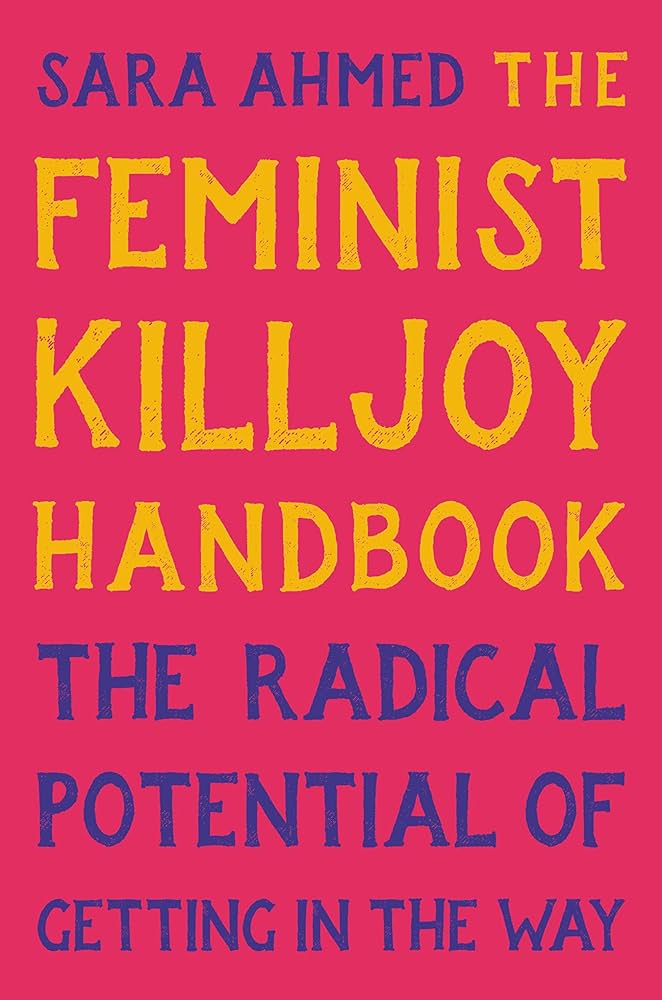Image: Sara Ahmed’s “The Feminine Killjoy Handbook”
On Wednesday, Feb. 28, the Center for Women and Gender Equity welcomed author Sara Ahmed, who presented her lecture “Traveling with Feminist Killjoys” to West Chester University students and faculty. Feminist killjoys are those who speak up when something offensive is said at the table. As you might know from your own familial interactions or life experiences, the person who speaks up at the table is almost never received well.
Ahmed, an independent queer feminist scholar of color, has written countless books, including “The Promise of Happiness.” Her most recent work, “The Feminist Killjoy Handbook,” is her first tradebook. “Her work changes lives. I know, because it has changed mine,” said Nicole Hoag, a student assistant of the Women’s and Gender Studies Collection who introduced Ahmed at the event. “Her work around the feminist killjoy helped me to think about my life differently and it gave me the tools to change the way I engage in the world around me. Because of her work, I think and live differently.”
Ahmed wrote the book to provide a helping hand for those who need support in fighting inequalities and injustices. She states that “being a feminist killjoy can take a lot out of us, but it can also bring to us moments of clarity and illumination.”
She acknowledges the negative reaction that being a feminist killjoy comes with and encourages them to commit to a willingness to cause unhappiness. Ahmed recognizes this pattern: “it is as if the problem wasn’t there until you made it so.”
Ahmed says these uncomfortable conversations happen because we try to polish away the bad parts of history. She remembers an instance when a colleague did not want to acknowledge any negative aspects of colonialism. A “Killjoy Truth” that she establishes in her handbook says that “to expose a problem is to pose a problem.”
She says that diversity initiatives at institutions can create a polish on the table or a shiny image of what they appear to address. This “sheen,” she states, “can stop a table from being seen” and creates the impression that everyone can participate in the conversation when that isn’t always the case. The real table without the sheen “comes into view when we don’t have a seat at it or when we are alienated by the conversation around it.”
While having a seat at the table is largely considered positive, Ahmed says this isn’t always the case. “You can see why it would be important to refuse to join some tables to enter into debates where you are the question or the topic of conversation,” she says of tables you don’t want to join. “When you are asked to debate your existence around a table, you are asked to witness yourself disappear.”
Another uncomfortable moment that can occur while you have a seat at the table is the telling of an offensive joke. Ahmed’s advice: “When it is not funny, do not laugh!” She explains that the joke alone isn’t all that alienates the person who is affected by it, but the laughter does as well. The preceding laughter lifts up the joke as well as the person telling it. By not laughing, feminist killjoys express that they do not condone such behavior.
Ahmed also spoke of doors, and how being a feminist killjoy can sometimes feel like closing the door on ourselves. In institutional settings, complaining about a supervisor or professor acting inappropriately can feel like closing a door of connection and opportunity on ourselves. However, when we ignore harassment or attempt to deal with it ourselves, we close the door to our own consciousness.
“To admit to violence can feel like becoming your own killjoy, getting in the way of your own progression,” said Ahmed. “Doors can hold a contradiction,” because we have to recognize that we are being harmed to make a complaint — and the complaint doesn’t always work.
When harassment or inappropriate behavior is part of or accepted by the culture, Ahmed states that we often “don’t identify it at the time — [we] experience it.” She recalled a professor who said he had to keep a big wooden table between him and his female students so he remembered not to touch them. While the inappropriateness of this behavior “looks so very clear from this hindsight perspective,” she said, this behavior was more commonplace in our earlier culture.
This is important to realize, she says, because the critical work being written about our earlier culture came out after the events occurred, so today’s work often represents issues of the past. There is currently a gap between critical work and reality. Because the words and theories we use to describe our current situations come from events and experiences of the past, we don’t always have the language or tools to describe or even identify discrimination that’s happening now.
Of using so many references to doors and tables, Ahmed stated, “We tend to notice what shuts us out.” We notice when doors are closed and we notice when we don’t have a seat at the table. If you want to learn more about Sara Ahmed or read her books, check out her website https://www.saranahmed.com/bio-cv/.
Emma Hogan is a fourth-year English major with a minor in Journalism. EH954390@wcupa.edu

